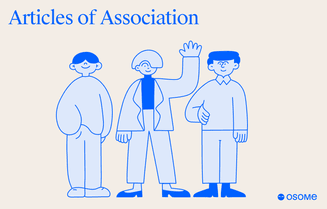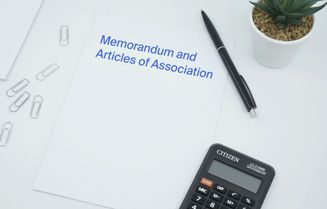Understanding the Company Memorandum and Articles of Association in Singapore
- Modified: 5 February 2026
- 13 min read
- Starting a Company


Heather Cameron
Author
From expert guidance and helpful accounting tips to insights on the latest trends in fintech, Heather is here to empower entrepreneurs and small business owners in Singapore with great content. With a background in digital marketing spanning eight years, she has experience writing for various industries and audiences. As Osome’s copywriter, she’s here to inform and inspire our readers with great storytelling.

Deepti Laddha
Reviewer
Deepti Laddha, our Head of Corporate Operations in Singapore, brings a decade of experience to her role, supporting our business writers in crafting insightful and engaging articles. With a strong background in corporate services, Deepti is a rich source of knowledge and expertise. We can count on her to assist in transforming any definition, concept or complicated jargon into helpful tips that help our readers take their businesses to the next level.
If you’re establishing a company in Singapore, understanding the Memorandum and Articles of Association, collectively referred to as the Company Constitution, is crucial. The memorandum outlines what the company is and aims to do, while the articles set the governance framework. It's important to note that the Memorandum of Association was replaced by the Company Constitution in 2016. This article will walk you through their significance and practicalities, providing a clear roadmap for your business’s legal foundation in Singapore.
Key Takeaways
- The Memorandum of Association is a foundational document defining a company’s structure, objectives, and legal boundaries, while the Articles of Association encompasses internal governance, management, and company operations, both binding in law.
- Since 2016, Singaporean companies no longer require separate Memorandum and Articles of Association, as new companies now use a single, comprehensive Company Constitution.
- Alterations to the Articles of Association in Singapore generally require shareholder approval through a special resolution, which usually means at least 75% approval, though this requirement may vary for some companies.
What Is a Memorandum of Association?
The Memorandum of Association is the cornerstone of any Singapore company and a necessary artefact for company incorporation. It sets forth the objectives and structure of a company and is a legal document that guides the relationship between the company and its shareholders. The document consists of the following clauses:
- Name Clause: Provides the company’s name and legal identity.
- Registered Office Clause: Specifies the company’s registered office address.
- Object Clause: Outlines the company’s purpose and activities.
- Liability Clause: Defines the liability of the company members.
- Capital Clause: Details the company’s share capital and its division.
- Subscriber Clause: Details the initial subscribers, their information, and their roles as shareholders.
- Rules: Details any additional internal regulations not covered by the above clauses.
Each clause provides a clear outline of the company’s structure, including its identity, location, purpose, responsibilities, and economic blueprint. It is not the same as the Articles of Association.

The Company Constitution (formerly referred to as M&AA) also outlines a company’s powers and objectives. It is a public document allowing external parties to see and understand different aspects of the company. However, note that the corporate landscape in Singapore has evolved. Since the Companies Amendment Act of 2014, the traditional need for separate Memorandum and Articles of Association has been consolidated into a singular, all-encompassing Company Constitution for new companies registered after January 3, 2016.
Stay compliant effortlessly with Osome. We help you prepare, file, and update your Company Constitution in line with Singapore’s regulations, ensuring your company meets legal requirements while you focus on growth. See our pricing packages.
What Are the Articles of Association?
The Articles of Association are the internal scaffolding that holds your company operations together. The memorandum and articles of association both lay out the internal governance, management, and the roles of company directors and shareholders within the corporate law framework. These two documents are the fundamental provisions for incorporated companies. They are followed by each board member and shareholder, ensuring that every scene in the company’s history plays out seamlessly according to the company’s structure.
However, the contents of the Articles of Association are not just for decorum; they come with legal authority, binding the company, its directors, shareholders, and, if applicable, company secretaries and guarantors. The Articles of Association can impose restrictions on the company’s power, setting limitations to safeguard the interests of those within and outside the company, thus defining the boundaries in which the company must operate.

Model Articles: The Standard Framework
For those seeking a foundation upon which to build their company’s articles, the Model Articles of Association provide a sturdy starting point. These model articles serve as a default rulebook under corporate law, offering a standardised framework for company governance. Companies may choose to adopt these standard articles as-is or to craft their own articles, tailoring the rules set to fit the unique contours of their business aspirations.
Model articles simplify the process of establishing a company by providing a backbone of rules and procedures. However, there is flexibility for those who wish to diverge from the standard form, ensuring that each company can fine-tune its governance to align with its specific vision and operational needs.
Company directors' and shareholders' roles in Articles
The Articles of Association delineate clear roles for the company’s helmsmen – the directors. They are vested with the authority to:
- Steer the company towards success
- Manage affairs and wield all powers of the company, save for those instances where the law or articles necessitate shareholder approval
- Decide on important matters spanning various domains, from the appointment of officers and executive compensation to entering contracts on the company’s behalf.
Conversely, initial shareholders enjoy rights such as attending general meetings and casting votes on pivotal decisions, thus wielding significant influence over the company’s governance. They can propose resolutions, which must be both written and lucid, to ensure alignment with the company’s best interests, and they must adhere to the Company Constitution and the law.
The Articles outline the procedures for shareholders’ and directors’ meetings, including notice periods, quorums, and voting rules. They also specify how dividends are to be distributed, detailing the directors’ authority to recommend dividends and the requirement for shareholder approval.
Alteration of the Articles of Association
Steps to alter your company’s Articles of Association in Singapore:
- Pass a special resolution, typically requiring approval from at least 75% of shareholders (requirements may vary for some companies).
- Notify the Registrar of Companies of the special resolution and any relevant court order within 14 days using the appropriate form.
- Submit the notice of resolution or court order to the Registrar.
- Receive the official confirmation, including a notice and updated Certificate of Incorporation, reflecting the changes.
In Singapore, a company can alter its constitution (Articles of Association) by passing a special resolution. Once approved, the changes become part of the company’s constitution from the date of the resolution. The notification to the Registrar of Companies, as required under the Companies Act, ensures that all changes are formally recognised. This documentation is crucial for maintaining the legal and operational integrity of the company.
Seeking professional advice can help guarantee compliance and a smooth implementation of the alterations. Don't hesitate to reach out!
Contents of Articles of Association
A company’s Articles of Association in Singapore outline the framework for its operations and management. They typically include:
- Company operations and management – Rules governing day-to-day business activities and internal decision-making.
- Member and shareholder responsibilities – Duties, obligations, and rights of company members and shareholders.
- Regulations and internal rules – Share transfer rules, meeting procedures, and other internal governance practices.
- Flexibility for amendments – Adopted upon incorporation, the Articles can be updated to reflect changes in the company’s business stage.
- Legal framework under the Companies Act – Singapore law does not prescribe specific content, giving companies discretion to define internal management rules.
- Binding agreement – Serves as a legal contract between the company and its members, and among the members themselves.
This structure ensures clarity, governance, and adaptability while protecting the interests of both the company and its stakeholders.
Locating Your Company's Foundational Documents
The Memorandum and Articles of Association, serving as the compasses of corporate governance, are obtainable from the Accounting and Corporate Regulatory Authority (ACRA) or through the expertise of a corporate services provider. Whether you need to confirm the structure of your company or ensure compliance with corporate law, a company's Articles of Association will serve as a testament to your registered existence to external parties.
To access these legal treasures, you can engage with ACRA or consult a corporate services provider who can facilitate the company's online registration process. These are the maps and manifests of your business, and they are as much a public declaration as they are a legal statement, ensuring transparency in the business realm. It is important to notify ACRA of any changes in your business information to stay compliant with official regulations and uphold corporate integrity.
The Importance of Carefully Drafted M&A Documents
Venturing into the corporate world without meticulously drafted Memorandum and Articles of Association is akin to sailing without a compass. These legal documents ensure compliance with the Companies Act, serving as the bedrock of stable and lawful operations. Engaging legal professionals or company formation agents to scrutinise every clause and article can prevent drafting errors and fortify one’s legal defences.
Distinctive Characteristics of M&A Documents for Various Types of Companies
The Memorandum and Articles of Association are tailored to fit the unique contours of different types of companies. From private limited enterprises to public juggernauts, the articles morph to reflect the distinct characteristics of each corporate entity. They are fundamental to the successful incorporation of any company.

Private Limited Companies (Pte Ltd)
Singapore thrives as a hub for Private Limited Companies, each with its own memorandum that underpins its regulations and procedures. The memorandum for these entities must carve out the company’s structure, objectives, subscribers and their initial share capital amount, and liabilities of members, forming the cornerstone of its incorporation.
The company's articles of association, on the other hand, govern the internal regulations, such as general meetings and director appointment procedures, ensuring that the company’s day-to-day affairs are managed smoothly.
Together, the Memorandum and Articles of Association bind the company and its members in a legal relationship, ensuring an incorporated company's regulations and procedures are adhered to.
For those seeking privacy, a shareholder agreement can act as a cloak, keeping sensitive details in the articles away from the public eye, unlike the memorandum and articles of associations, which are open books for all to peruse.
Public Companies Limited by Shares
Public Companies Limited by Shares are the mighty vessels of the corporate sea, and their foundational documents must be robust enough to withstand the scrutiny of public offerings and financial reporting. These documents are the rudder and sails that guide the company, with the memorandum and articles of association acting as binding contracts between the company and its members and among the members themselves.
While a shareholder agreement can shield private details, the memorandum and articles are the beacon that signals the company’s internal regulations and governance to the world. These documents outline the rights, powers, and obligations of those steering the ship and ensure that all aboard have a say in its course.
Public Companies Limited by Guarantee
According to definitions in the Companies Act, Public Companies Limited by Guarantee are the altruistic entities of the corporate realm, often established for non-profit objectives without the lure of share capital. The members’ commitment is their guarantee, pledging to contribute to the company’s assets in dire straits, as defined by the Constitution (Memorandum and Articles of Association). The liability of each member is capped at the amount they have guaranteed, providing a safety net for their financial contributions.
Such a company's articles of association for these noble ventures must be registered, laying down the governance laws of the land, with the power to bind the members to the corporation's benevolent mission. These articles, including provisions on member liabilities, act as the charter of trust and duty that binds all members to any philanthropic quest.
Exempt Private Companies (EPCs)
Exempt Private Companies (EPCs) are the nimble crafts of Singapore’s corporate fleet, favoured for their less burdensome compliance requirements and privacy privileges. With a limited number of shareholders and no corporate entities holding sway, these Singapore companies can navigate the regulatory seas with relative ease, free from the obligation of mandatory annual audits if their turnover remains modest.
EPCs can be helmed by a single shareholder, with the Memorandum and Articles of Association serving as the only public documents required for registration. The board must affirm the company’s solvency annually, a declaration that serves as a testament to the company’s financial health and operational integrity.
The Interplay Between the Company's Memorandum and Its Constitution
The Company Memorandum and the Company Constitution are not separate entities but rather a harmonious duet. Historically, the Company Memorandum held the higher note, serving as a binding agreement between the company and its shareholders. It had the power to decide the company’s fate if it ventured into realms beyond its prescribed powers, rendering such actions void. This document was the legal compass that ensured the company did not stray into the unknown waters of ultra vires activities. However, in modern times, the Constitution has taken on this role, acting as the actual guiding document that outlines the rules, regulations, and governance of the company.
Difference Between Articles of Association and Memorandum
While both documents are pillars of the company’s legal structure, the Memorandum of Association and the Articles of Association serve distinct purposes.
The Memorandum is the declaration of company formation, a legal statement signed by the initial members.
The Articles govern the internal mechanics of the company. They address the essential elements such as:
- member liability and responsibilities
- directors’ powers
- subscribers and share management
- the processes for decision-making, including general meeting frequencies and director appointment procedures
Historically, the Memorandum of Association included provisions that are now part of the Constitution of a company in Singapore. For companies established before July 1, 2015, these provisions are treated as part of the Constitution, highlighting the evolution of corporate documentation. Companies can opt for model constitutions provided by the Accounting and Corporate Regulatory Authority (ACRA) or draft their bespoke versions, submitting them to ACRA during the company’s formation. This ensures compliance with current corporate governance standards and facilitates the smooth operation of the company.
Both articles must be registered upon incorporation.
How Osome Can Help
Osome assists companies in Singapore with the preparation, review, and updating of their corporate constitution. For older companies, this includes ensuring that their Memorandum and Articles of Association are compliant and accurately reflect the company’s structure. For newer companies, we help maintain a fully compliant Company Constitution, including any amendments and filings with ACRA. Our team handles the paperwork and regulatory submissions, giving you peace of mind while keeping your company’s governing documents accurate and up-to-date.
Summary
It is clear that the Memorandum and Articles of Association decide the corporate existence of your business. The Memorandum sketches the company’s ambitions, and the Articles of Association orchestrate its internal governance. Both are the legal threads that weave through the fabric of a company, holding the structure together and allowing it to evolve and adapt to the corporate stage.
Let this article serve as your guide, whether you’re drafting your company’s first pages or revisiting them to discuss an amendment. Remember, in the complex world of corporate governance, precision and foresight in your company’s foundational documents are not just an asset but a necessity. May your company’s constitution be as resilient as it is dynamic, shaping a legacy that withstands the test of time.






